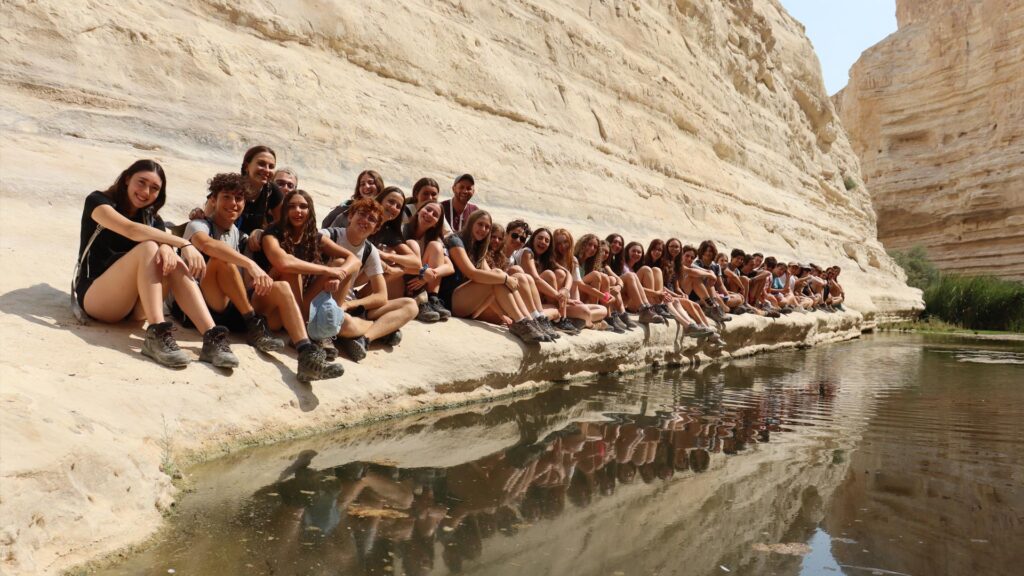
This morning at Shabbat services, I had the privilege of listening to one of our high school students deliver the sermon in our synagogue. She had just returned from a semester-long program in Israel—a formative journey that left its mark not only on her, but on all of us who heard her speak.
Her words were beautiful. Her delivery was poised. Her reflections were thoughtful, sincere, and deeply personal. But that wasn’t what moved me most.
What stayed with me long after the service ended was her sense of ownership. Her pride. Her unwavering belief that her story is inextricably linked to the story of our people. She didn’t just speak about Israel—she spoke from within Israel. As someone who had walked the land, wrestled with its complexity, tasted its promise, and come to feel that it belonged to her—and that she, in turn, belonged to it.
She stood before the congregation not only as a student, but as a steward. As someone ready to carry the legacy forward.
And in that moment, I was reminded—once again—that the future of the Jewish people rests not in our institutions, our buildings, our budgets, or even our rabbis. It rests in them. In our children. In how deeply they feel connected to their identity, and how willing they are to claim it as their own.
When I entered the rabbinate, I had a clear sense of mission. I wanted to build a generation of literate Jews—people who could open a text, navigate the Siddur, engage with Jewish history and philosophy with fluency and depth. And that vision still guides much of what I do. Jewish literacy remains foundational. But over the years, one truth has come to eclipse all others: if our children are not proud to be Jewish, if they are not inspired, grounded, and prepared to live that identity out loud—then no amount of knowledge will save us.
Because we are living in a time when it is all too easy to walk away.
We cannot take Jewish continuity for granted. Not in an age of distraction. Not in a climate of rising antisemitism. Not when Jewish identity often feels like a burden to explain or defend. Our children are growing up in a world that constantly tells them to blend in, to relativize, to question whether particularism is even worth holding onto.
And yet—in defiance of all that—we see young Jews in our community choosing to lean in. Choosing to go to Israel, not just on short trips but for immersive, intensive programs. Choosing to defer college for a gap year of Torah study, cultural exploration, or army service. Choosing to stand with and for their people, even when it’s unpopular or uncomfortable. Choosing, in some cases, to dedicate their lives to the Jewish world as rabbis, cantors, educators, and leaders.
Let us not underestimate the power of these choices.
Especially in a community like ours—modest in size, geographically distant from Jewish hubs, lacking some of the resources and density of major metropolitan areas—it would be easy to resign ourselves to quiet decline. But that is not our story. Our story is one of remarkable commitment: of families who prioritize Jewish education even when it’s costly and inconvenient; of students who embrace their identity with seriousness and pride; of a community that, against the odds, keeps producing young people with passion, conviction, and a sense of sacred responsibility.
There are dozens of metrics by which to evaluate a Jewish community’s “success”: synagogue membership, endowment totals, participation rates, dollars raised, social media reach, building expansions, annual gala attendance. These numbers matter—they tell part of the story. But they are not the whole story. And they are certainly not the most important part.
The ultimate metric—the one that truly predicts whether a community will survive and thrive 25, 50, or 100 years from now—is the character, courage, and clarity of its youth. Their strength. Their love. Their sense of belonging. Their ability to say, with conviction: This is who I am. This is where I come from. This is my people. This is my future.
Call it an endowment of continuity. Not one measured in market performance or portfolio balance, but in pride, purpose, and Jewish permanence.
Because here is the truth we must hold close: no building, no budget, no organizational structure—no matter how impressive—can secure our future if we do not win the hearts of our children. And if we do win them? If we inspire our young people to walk proudly, speak clearly, and live with unapologetic Jewish purpose—then even the smallest of communities can be mighty.
When I listened this morning, I didn’t just hear a speech. I heard an answer to the question every Jewish leader asks—Will we still be here? And the answer, at least in that moment, was yes. Emphatically yes.
Because she had inherited something sacred. And she was already carrying it forward.
Leave a Reply